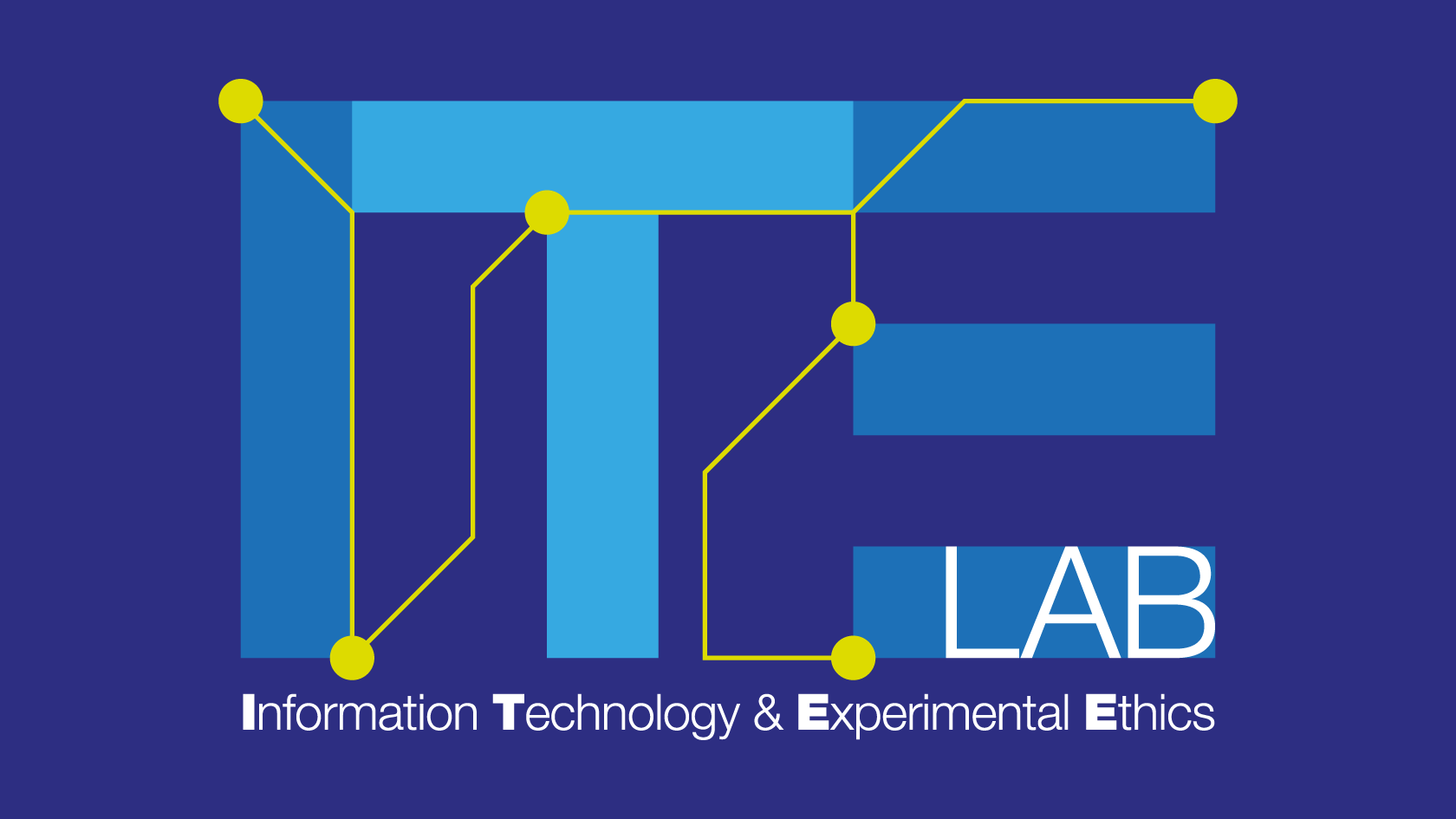Information, Technology & Experimental Ethics Lab (ITE)

ITE – meaning “go” in Latin, and an acronym of Information, Technology & Experimental Ethics
Vision and Mission
The Information, Technology & Ethics (ITE) Lab is dedicated to advancing knowledge at the intersection of information, public health, and emerging technologies. Our mission is to deepen the scientific understanding of how information shapes societies, and to translate this knowledge into ethical frameworks and practical strategies that safeguard well-being and justice.
What makes the ITE Lab distinctive is our methodological approach. We work at the intersection of bioethics, psychology, communication sciences, and computer science, combining experimental setups with normative analysis. Rather than adhering to one disciplinary tradition, we let research questions guide the methods we employ, whether established, emerging, or entirely novel. This flexibility allows us to design innovative studies, test interventions in real-world and laboratory environments, and integrate empirical results into ethical deliberation.
By collaborating across disciplines and engaging with new technologies, we aim to produce knowledge that is both rigorous and relevant, not only through academic contributions, but also policy and practice – locally and globally. At its core, the ITE Lab is committed to one overarching goal: ensuring that societies can ethically navigate the challenges of mis/disinformation and disruptive technologies.
Research Goals and Areas
Our research agenda addresses some of the most pressing issues of our time. We focus on two interconnected domains:
1. Infodemics and Mis/Disinformation
We study the dynamics of misinformation and disinformation, particularly in the context of public health crises. Our projects investigate how false or misleading information spreads, how emotions and cognitive biases influence belief formation, and how critical thinking and information literacy can be strengthened. We also test innovative interventions, from educational strategies to AI-based tools, to counter the impact of infodemics and improve societal resilience.
2. Emerging Technologies and Information Ethics
As artificial intelligence and other technologies reshape how information is produced, shared, and consumed, we study their ethical implications. This includes investigating bias in large language models, the governance of persuasive AI, and the responsibilities of institutions that deploy such technologies. Our goal is to anticipate risks, articulate ethical frameworks, and provide actionable recommendations for policymakers, educators, and the public.
Leadership
The ITE Lab is directed by Dr. Federico Germani and Dr. Giovanni Spitale.
Opportunities and Collaborations
We actively welcome students, researchers, and institutions interested in collaborating with us.
Team
Federico Germani (Co-director) federico.germani@ibme.uzh.ch
Giovanni Spitale (Co-director) giovanni.spitale@ibme.uzh.ch
Simone Redaelli (Associated Researcher)
Apurva Watve (Stehr-Boldt Fellow)
Anna Naishtat (Research Assistant)
Ladina Kunz (MD Student)
Gaia Contu (Visiting PhD student)
Featured Publications
Germani F, Spitale G. “Source framing triggers systematic evaluation bias in Large Language Models”. Science Advances, 7 Nov 2025, Vol 11, Issue 45. https://doi.org/10.1126/sciadv.adz2924
Redaelli S, Biller-Andorno N, Gloeckler S, Brown J, Spitale G, Germani F. “Mastering critical thinking skills is strongly associated with the ability to recognize fakeness and misinformation”. Frontiers in Education. May 30, 2025. https://www.frontiersin.org/journals/education/articles/10.3389/feduc.2025.1577692/full
World Health Organization. “Social listening in infodemic management for public health emergencies: guidance on ethical considerations”. Apr 8, 2025. https://www.who.int/publications/i/item/9789240108202
Vinay R, Spitale G, Biller-Andorno N, Germani F. “Emotional prompting amplifies disinformation generation in AI large language models”. Frontiers in Artificial Intelligence. Apr 7, 2025. https://www.frontiersin.org/journals/artificial-intelligence/articles/10.3389/frai.2025.1543603/full
Spitale G, Biller-Andorno N, Germani F, Merten S. “Digital Democracy and Emergency Preparedness: Engaging the Public in Public Health”. International Journal of Public Health. Dec 20, 2024. https://www.ssph-journal.org/journals/international-journal-of-public-health/articles/10.3389/ijph.…
Germani F, Spitale G, Biller-Andorno N. “The Dual Nature of AI in Information Dissemination: Ethical Considerations”. JMIR AI. Oct 15, 2024. https://ai.jmir.org/2024/1/e53505/
Germani F, Spitale G, Machiri SV, Ho CWL, Ballalai I, Biller-Andorno N, Reis AA. “Ethical Considerations in Infodemic Management: Systematic Scoping Review”. JMIR Infodemiology. Aug 29, 2024. https://infodemiology.jmir.org/2024/1/e56307/
Spitale G, Germani F, Biller-Andorno N. “Disruptive Technologies and Open Science: How Open Should Open Science Be? A ‘Third Bioethics’ Ethical Framework”. Science and Engineering Ethics. Aug 9, 2024. https://link.springer.com/article/10.1007/s11948-024-00502-3
Germani F, Spitale G, Biller-Andorno N. “Beyond Trade-Offs: Autonomy, Effectiveness, Fairness, and Normativity in Risk and Crisis Communication”, The American Journal of Bioethics. May 20, 2024.
Spitale G, Biller-Andorno N, Germani F. “AI model GPT-3 (dis)informs us better than humans”. Science Advances. Jun 28, 2023. https://www.science.org/doi/10.1126/sciadv.adh1850
Spitale G, Germani F, Biller-Andorno N, “The PHERCC matrix. An ethical framework for planning, governing, and evaluating Risk and Crisis Communication in the context of Public Health Emergencies.” The American Journal of Bioethics. Apr 28, 2023. https://www.tandfonline.com/doi/full/10.1080/15265161.2023.2201191
Germani F, Pattison AB, Reinfelde M., “WHO and digital agencies: how to effectively tackle COVID-19 misinformation online.” BMJ Global Health. Aug 2, 2022. https://gh.bmj.com/content/7/8/e009483.info
Germani F, Biller-Andorno N, “How to counter the anti-vaccine rhetoric: Filling information voids and building resilience.” Human Vaccines & Immunotherapeutics. July 8, 2022. https://www.tandfonline.com/doi/full/10.1080/21645515.2022.2095825
Spitale G, Biller-Andorno N, Germani F, Concerns Around Opposition to the Green Pass in Italy: Social Listening Analysis by Using a Mixed Methods Approach. Journal of Medical Internet Research. Feb 16, 2022. https://www.jmir.org/2022/2/e34385